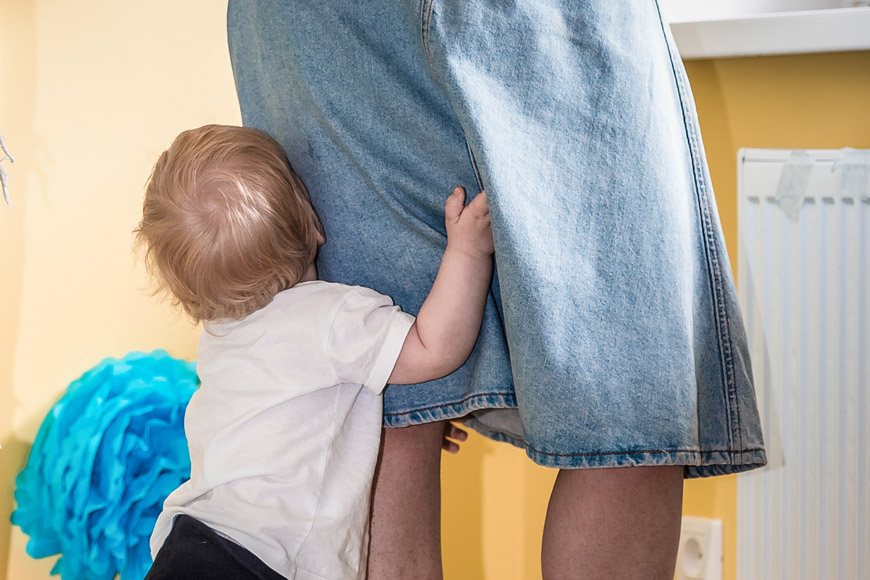10 Effective Parenting Tricks for Separation Anxiety
These parenting tips are just the answers to soothing separation anxiety for both the mum and little one
19 December 2019
Clarice

A mum's work is never done.
From wiping mealtime spills to playground outings and late-night infant crying, we begin to appreciate the little moments we get to spend with just ourselves - whether it's running an errand or catching up with friends over a well-earned brunch.
That is - if you ever manage to escape out the door. Some toddlers experience separation anxiety and will gladly let everyone know just how healthy his or her lungs are the moment mummy is gone from the room. Other times, your little one turns into a little octopus who will cling onto your leg.
For older kids, the separation anxiety hits when they start nursery, school, or when a new school year begins. It's completely natural for young children to feel anxious when a parent says goodbye.
With that mind, it's always good to welcome a parenting tip or two that will make separation anxiety easier for children and less guilty for mums.
We've rounded up the best (and slightly cheeky) parenting tips to managing separation anxiety in kids, from parents who have been there and done that. As outrageous as a few of these may sound, each has its own effective truth behind it.
1. Let your presence stay after you've gone
Use an item, such as a photo, one of mum's accessories, or even a little drawing so that the child can feel like their parent is around. These little things can act as an emotional balm for kids.
You can leave an accessory such as a hairpin with your child to bring to school, asking them to keep it safe for you. Another idea is drawing a "heart button" on your arm and theirs, telling him or her that pushing the drawing will let you know they're sending their feelings to you.
2. Reverse psychology
Before leaving the house, tell your child to come to you because you want them to help you out with chores or another activity they really don't like.
Best for the slighter bigger kids who dislike stuff like chores - sometimes you have to do what you've got to do to have some alone time. Just don't make it a habit, as sooner or later the child will catch on and you're again out of luck.
3. Create a goodbye ritual
A goodbye ritual can be very reassuring for your child and can be as simple as a kiss at the door, or something more complex like a 10-step special handshake. What's important is that it needs to be short, sweet, and without major fuss.
Mindfulreturn.com suggested, "A kiss, a hug, and a push out the door". Young kids love doing things that they've been taught not to, like shoving mummy's bum out the door. Just don't forget to do your goodbye ritual, because this mum did:
4. Be specific to your child's routine
Consider discussing when you'll be returning and by explaining the time in a way your child can understand.
Instead of telling him or her, "I'll be back home in 5 days", switch it out for "I'll be home in 5 sleeps." If you're sure you'll be picking them up from kindergarten by 3 pm, say "I'll be back after nap time and a snack."
5. Keep your promises
After you let your child know when you'll be coming back, try your best to follow through on that promise. Doing so will help your little one develop the confidence they need to handle separation in the long-run.
In the event you can't go with your promise, inform your kid before the expected time or date. Don't show up late without notifying them first, either through a reassuring phone or video call.
6. Get a replacement
For some mums, that means a cardboard cutout.
To stop her one-year-old son from crying whenever she's gone, a Japanese mother leaves lifesized cardboard cutouts of herself so that her child believes she's there. While mum goes off to run errands, her son blissfully plays with his toys and watches cartoons in front of a cutout of his mum sitting in the living room.
7. Have a primary caregiver
Whether you hire someone or ask a favour from a friend or relative, do try and keep your child's caregiver consistent. Long-term caregivers help to avoid further separation anxiety in your child. Start by introducing the new caregiver to your child on several occasions, such as inviting them to your home to meet and play.
Gradually getting your kid familiar with his or her new caregiver will help make goodbyes easier.
8. Schedule separations after mealtime or naps
Babies and young children are more susceptible to separation anxiety when they feel hungry or tired.
9. Practice being away from each other
Practicing separation can give your kid the chance to prepare and experience how it's like being apart. If you can, have your child stay with the grandparents during the weekend, schedule their playdates at their friend's home, and ask friends or family to babysit them for at least an hour.
Before starting preschool or daycare, help your child familiarise themselves with the environment by visiting the school and spending time playing.
10. Don't give in
As tempting as it is to stay a little longer, especially when they're tearfully clinging onto your clothes or bawling like you're never coming back, don't give in. Doing so will make the transition time longer.

























.png?itok=SvZPqMHH)




.png?itok=uB2ieOR7)












